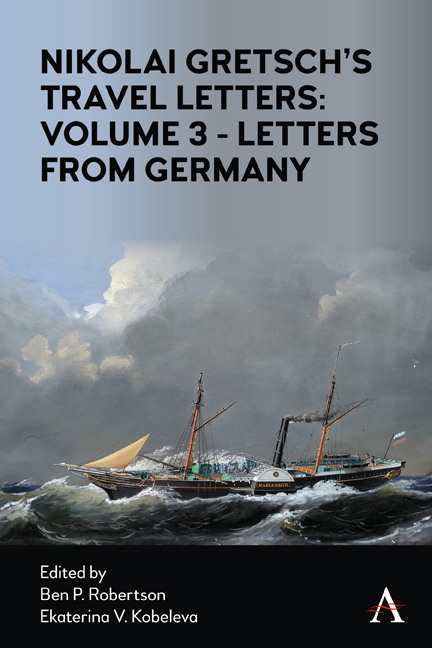Book contents
- Frontmatter
- Contents
- List of Illustrations
- Abbreviations
- Miscellaneous Frontmatter
- Introduction to Volume 3
- Letter XXXI
- Letter XXXII
- Letter XXXIII
- Letter XXXIV
- Letter XXXV
- Letter XXXVI
- Letter XXXVII
- Letter XXXVIII
- Letter XXXIX
- Letter XL
- Letter XLI
- Notes on this Translation
- Selected Bibliography
- Index
Letter XXXVI
Published online by Cambridge University Press: 22 October 2021
- Frontmatter
- Contents
- List of Illustrations
- Abbreviations
- Miscellaneous Frontmatter
- Introduction to Volume 3
- Letter XXXI
- Letter XXXII
- Letter XXXIII
- Letter XXXIV
- Letter XXXV
- Letter XXXVI
- Letter XXXVII
- Letter XXXVIII
- Letter XXXIX
- Letter XL
- Letter XLI
- Notes on this Translation
- Selected Bibliography
- Index
Summary
The road to Vienna. Wasserburg. Partenkirchen. Salzburg. The leech trade. Pleasant views. Faults of the postal coach service. Linz. Women. Towers. Conversation about Austria. Amstetten. A female travel companion. Arrival in Vienna. Hotel.
The road from Munich to Vienna runs through beautiful locales. To the left of the road is a settlement called Hohenlinden, famous for the victory won on the 8th of December 1800 by General Moreau over the Austrians. This place looks very prosaic and does not excite any interest unless one consults a historical dictionary. The first town that is beautiful and original is Wasserburg: it lies in a deep ravine on the bank of the River Inn, which makes a sharp curve at this location. In general, the valley of the river, winding between high hills, is very picturesque. The Salzburg Mountains look blue in the distance. Occasionally, the ruins of knightly castles appear: the most notable of them is Werdenfels. But there are sites even more ancient: a small place called Partenkirchen was a glorious and rich town named Parthanum in the times of the Romans. The Roman troops bivouacked in it during the campaign from Italy to Germany. In later times, when trade routes from the East lay through Venice and Genoa, the town served as a center for storing merchandise. The proximity of Italy is becoming more noticeable: in a small place called Mittenwald, the men make violins, and their wives knit silk purses: both of these items are shipped to foreign lands in large quantities. Just past Teisendorf is the Austrian border. Here, I said goodbye to Bavaria, which I shall not forget as long as I live.— We arrived in Salzburg in the evening and stopped for the night. Our departure was set for ten o’clock in the morning, and I hoped to walk for two hours through the town and feast my eyes upon its charming surroundings. It was not meant to be. In the morning, we had to complete the customs procedures—wait for the customs officials, open suitcases, sign papers. The time slipped away. The hour set for departure arrived, but we still were not finished. It turned out that the next scheduled diligence conductor was sick, and there was no official replacement for him. One old man among the passengers took the duty of a conductor upon himself—collected travel vouchers, fees, etc., and we departed after eleven.
- Type
- Chapter
- Information
- Publisher: Anthem PressPrint publication year: 2021

